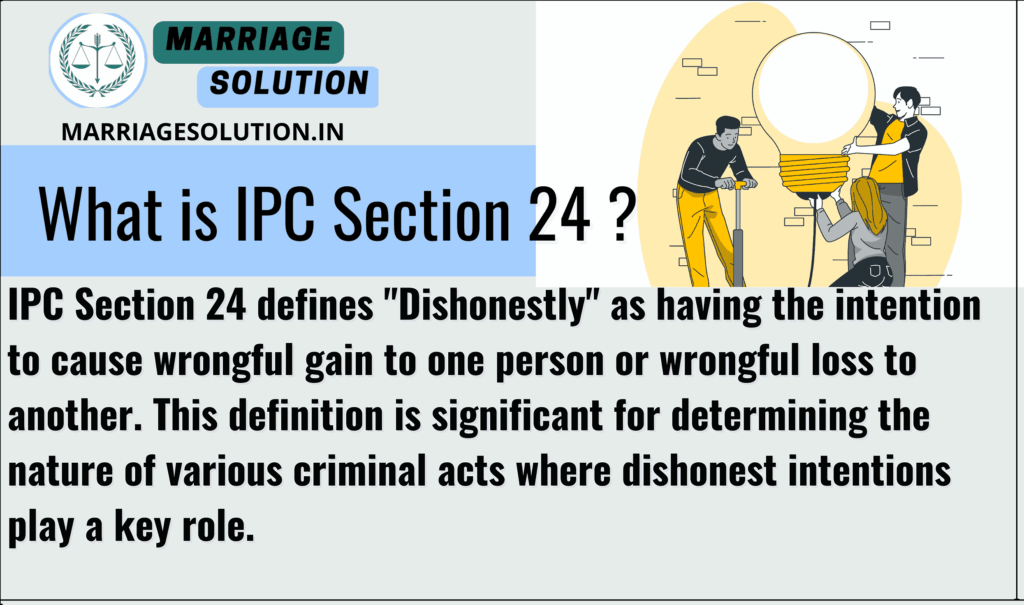Introduction of IPC 24
IPC Section 24 is a crucial provision in the Indian Penal Code that defines the term “Dishonestly.” This section is essential for understanding various offenses involving dishonest intentions.
- Introduction of IPC 24
- What is IPC Section 24 ?
- IPC Section 24 Overview
- Public servant section 24 IPC
- IPC 24 Punishment
- 24 IPC bailable or not ?
- Section 24 IPC in short information
- IPC Section 24 FAQs
- If you need support with court proceedings or any other legal matters, don’t hesitate to reach out for assistance.
What is IPC Section 24 ?
IPC Section 24 defines “Dishonestly” as having the intention to cause wrongful gain to one person or wrongful loss to another. This definition is significant for determining the nature of various criminal acts where dishonest intentions play a key role.

IPC Section 24 Overview
IPC Section 24 defines “Dishonestly” as having the intention to cause wrongful gain to one person or wrongful loss to another. This definition is significant for determining the nature of various criminal acts.
Key Points Explained
- Definition of Dishonestly:
- Dishonestly means intending to cause wrongful gain to one person or wrongful loss to another.
- This definition helps in identifying the dishonest intentions behind various criminal acts.
- Wrongful Gain and Loss:
- Wrongful gain is when a person gains something they are not entitled to, and wrongful loss is when someone loses something they are entitled to.
- IPC Section 24 covers both scenarios to ensure justice is served.
- Application in Law:
- IPC Section 24 is applied in cases where dishonest intentions are involved.
- This section helps in prosecuting individuals who act with dishonest intentions.
- Legal Interpretation:
- Courts use IPC Section 24 to interpret the dishonest motives behind criminal acts.
- This section aids judges in understanding the intent behind actions.
- Comprehensive Coverage:
- IPC Section 24 covers a wide range of scenarios involving dishonesty.
- This ensures that all dishonest actions are addressed under the law.
- Judicial Precedents:
- Previous court rulings based on IPC Section 24 guide future cases.
- This section provides a basis for consistent legal judgments.
Public servant section 24 IPC
The law has a special word: “dishonestly” (IPC Section 24). This word is key to understanding many crimes committed by public servants. It basically means acting with the intention to cheat or steal, either for personal gain or to harm someone else.
Examples:
- Taking a bribe (IPC Section 161): A public servant who takes a bribe to influence their actions is acting “dishonestly” for personal gain.
- Misusing government property (IPC Section 409): A public servant who dishonestly misuses government property is committing a crime.
The Importance of “Dishonestly”
By defining “dishonestly,” IPC Section 24 helps hold public servants accountable when they abuse their power or act with corrupt intentions. It’s like a key that unlocks the meaning of many public servant offenses.
IPC 24 Punishment
The law has a special word: “dishonestly” (IPC Section 24). This helps understand crimes where someone cheats or steals. Other laws set the punishments.
24 IPC bailable or not ?
The law uses a special word: “dishonestly” (IPC Section 24). This helps understand crimes where someone cheats or steals. The punishment and whether someone can get bail depend on the specific crime and other related laws.
Section 24 IPC in short information
| Aspect | Details |
|---|---|
| Definition | IPC Section 24 defines “Dishonestly” as intending to cause wrongful gain to one person or wrongful loss to another. |
| Offense | Involves dishonest intentions behind various criminal acts. |
| Punishment | No specific punishment under IPC Section 24; depends on related sections describing the actual offense. |
| Bailable or Not | Depends on the specific offense and related sections of the IPC. |
IPC Section 24 FAQs
What does IPC Section 24 define?
IPC Section 24 defines “Dishonestly” as having the intention to cause wrongful gain or wrongful loss.
Does IPC Section 24 prescribe any punishments?
No, IPC Section 24 does not prescribe specific punishments. It defines dishonesty, which is used with other sections.
Is an offense involving IPC Section 24 bailable?
The bailability of an offense involving IPC Section 24 depends on the specific offense and related sections of the IPC.
How is “Dishonestly” used in legal proceedings?
“Dishonestly” is used to interpret the intent behind various criminal acts, aiding in prosecution and judgment.
Why is IPC Section 24 important?
IPC Section 24 is crucial for understanding and identifying dishonest intentions in criminal acts, ensuring justice is served.
If you need support with court proceedings or any other legal matters, don’t hesitate to reach out for assistance.
Court or any other marriage-related issues, our https://marriagesolution.in/lawyer-help-1/ website may prove helpful. By completing our enquiry form and submitting it online, we can provide customized guidance to navigate through the process effectively. Don’t hesitate to contact us for personalized solutions; we are here to assist you whenever necessary!
